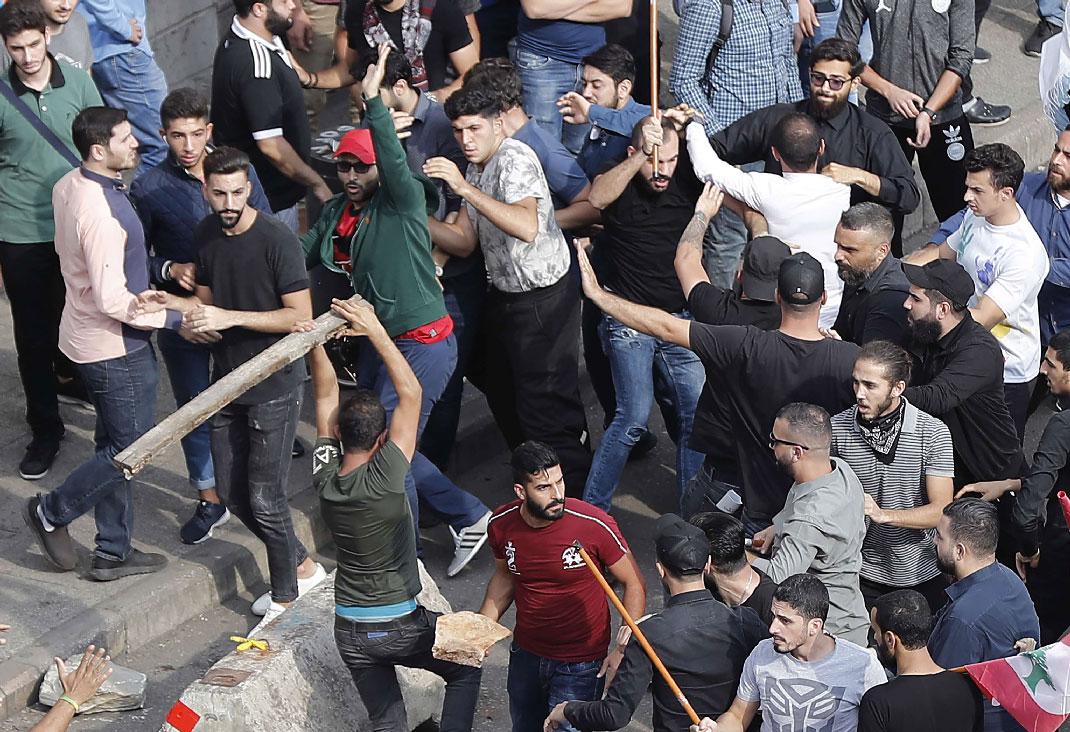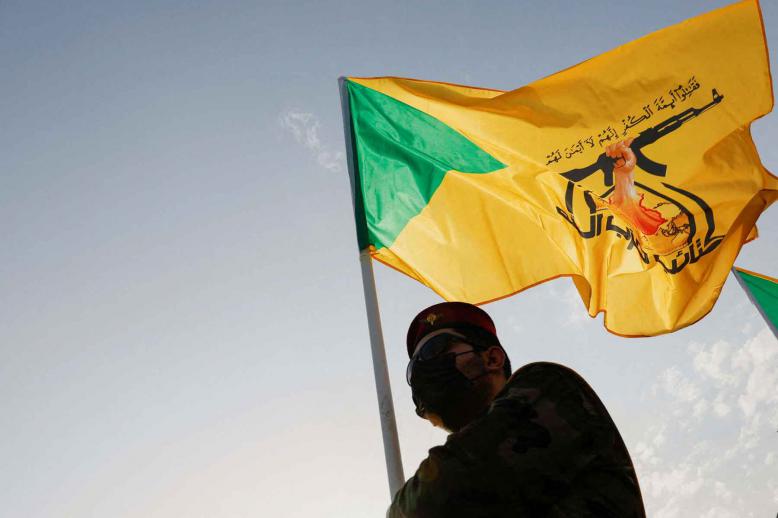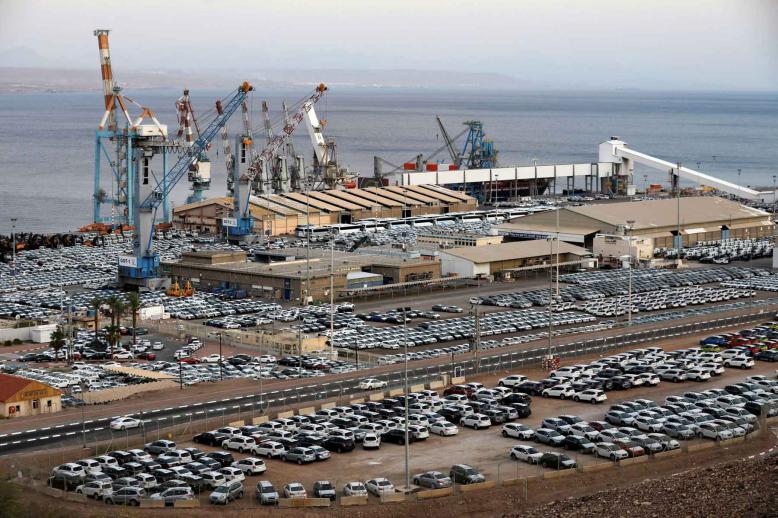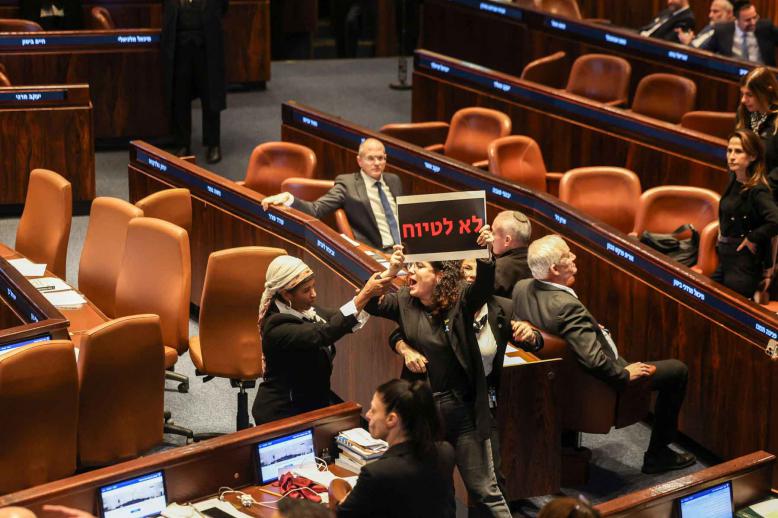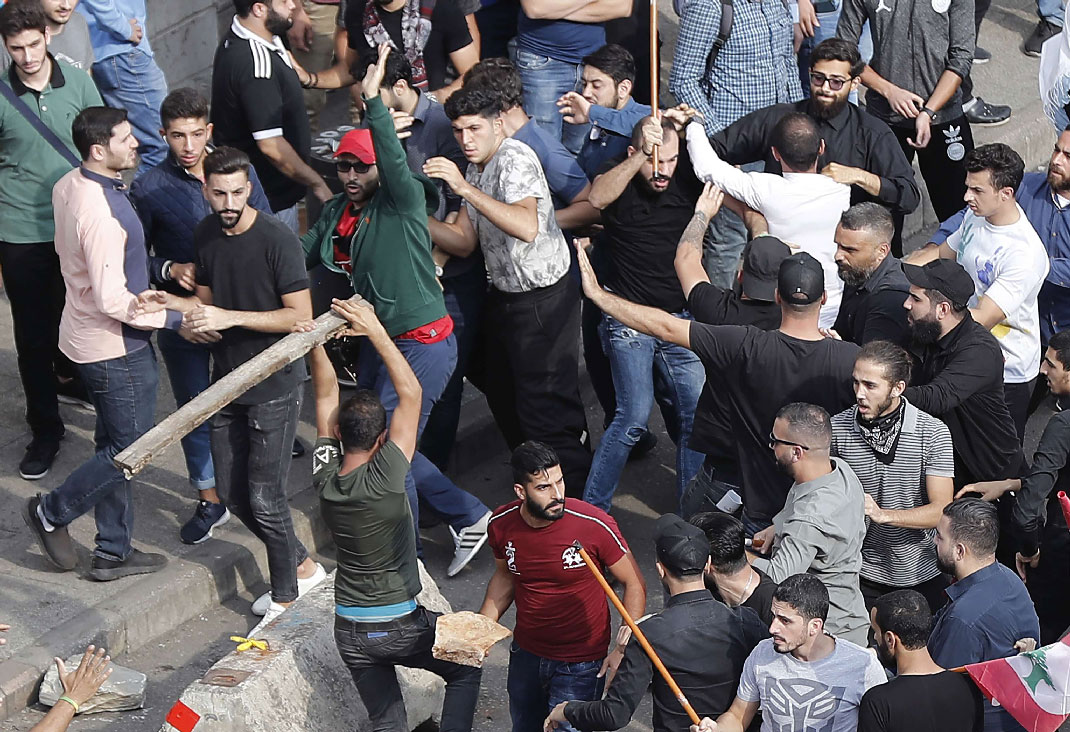Hezbollah, allies undermine non-sectarian protests
BEIRUT - Anti-corruption protesters cut off major roads in Lebanon for a ninth day Friday, pledging to keep paralysing the country despite an offer by the president to meet their representatives.
The demonstrators, who have thronged towns and cities across Lebanon prompting the closure of banks and schools, have been demanding the removal of the entire political class, accusing it of systematic corruption.
Numbers have declined since Sunday, when hundreds of thousands took over Beirut and other cities in the largest demonstrations in years, but could grow again over the weekend.
Lebanon's largely sectarian political parties have been wrong-footed by the cross-communal nature of the demonstrations, which have drawn Christians and Muslims, Shiite, Sunni and Druze waving Lebanese national flags rather than the partisan colours normally paraded at demonstrations.
"All of them means all of them," has been a popular slogan, with most protesters united in demanding the resignation of all of Lebanon's political leaders regardless of sect or political affiliation.
Nevertheless, groups of people chanting in solidarity with the country's powerful Iran-backed Hezbollah group pushed into a peaceful demonstration on Friday in Beirut, briefly scuffling with protesters and prompting riot police to intervene.
Dressed in plain black t-shirts common to Shiite Hezbollah and Amal movement supporters, the men shouted "we heed your call, Nasrallah," in reference to Hezbollah leader Sayyed Hassan Nasrallah, who was due to give a speech later on.
Similar scuffles broke out on Thursday night at the same site in central Beirut, injuring one protester. The partisan display grated with the non-sectarian atmosphere cultivated by most of the protesters.
Following the scuffles more riot police with masks and batons were dispatched to the square on Friday to defuse the situation, which appeared to be growing more tense.
Some people began lobbing stones and sticks, threatening to quickly turn the so far peaceful protests violent.
"Nasrallah is more honourable than all of them," they chanted about government leaders accused of corruption by the protesters. "Riad Salameh is a thief," they shouted, in reference to the central bank governor.
Video from Thursday night showed crowds of Hezbollah partisans in Beirut's Riyad al-Solh square singing their loyalty to Iran's Supreme Leader, Ayatollah Ali Khamenei.
In his speech broadcast on Friday, Nasrallah warned that nationwide protests could push the country into chaos, collapse and, "God forbid", civil war - alluding to the catastrophic civil war that the country suffered between 1975 and 1990. Lebanon's current sectarian power-sharing system was borne out of that war, through the Taif agreement of 1989.
Many of Lebanon' current political leaders are former warlords who transfer power through what is seen by protesters as a hereditary and corrupt ruling elite. But Nasrallah also rejected the demonstrators' calls to bring down the entire government.
"We do not accept the fall of the presidency nor do we accept the government's resignation and we do not accept, amid these conditions, holding early parliamentary elections," Nasrallah said.
Praising the protest movement for achieving "unprecedented" economic reforms announced this week, he said Lebanon must now search for ways to move forward and prevent a dangerous power vacuum.
Nasrallah is considered one of the country's most influential figures, and Hezbollah has both a presence in government and a well-armed militia that has fought in Syria for the dictator Bashar al Assad.
Nasrallah called on his supporters to leave anti-government protests to avoid friction and seek dialogue instead.
He said the protests in Lebanon are no longer spontaneous and popular but have become politicized. He said political rivals who are critical of his group's political line are manipulating the protests.
He accused international and regional powers, who are also against his party, of funneling money to fund the protests. Hezbollah is facing widening US sanctions amid tension between Washington and Tehran, and has an acrimonious relationship with Israel after the group played a key role in beating back the Zionist State's forces during a war in 2006.
Hezbollah also faces pressure from Iran's regional rivals in the wider Arab world, including Saudi Arabia and the United Arab Emirates.
Risk of chaos
The nationwide protests have been fuelled by deteriorating economic conditions. Protesters say the ruling elite have driven the economy to collapse through corruption and mismanagement.
In attempts to calm the anger, Prime Minister Saad Hariri has pushed through a package of economic reforms, while President Michel Aoun offered Thursday to meet with representatives of the demonstrators to discuss their demands.
But those measures have been given short shrift by demonstrators, many of whom want the government to resign to pave the way for new elections.
"We want to stay on the street to realise our demands and improve the country," one protester, who asked to be identified only by his first name Essam, said.
"We want the regime to fall... The people are hungry and there is no other solution in front of us," said Essam, a 30-year-old health administrator.
On Friday morning, protesters again cut some of Beirut's main highways, including the road to the airport and the coast road towards second city Tripoli and the north.
On the motorway north of Beirut, demonstrators had erected tents and stalls in the centre of the carriageway.
But there was no sign any move by the army to try to reopen the road.
In central Beirut, where street parties have gone on into the early hours, groups of volunteers again gathered to collect the trash.
"We are on the street to help clean up and clean up the country," volunteer Ahmed Assi said.
"We will take part in the afternoon to find out what the next stage will be," said the 30-year-old, who works at a clothing company.
Persistent deadlock between Lebanon's rival faction leaders has stymied efforts to tackle the deteriorating economy, while the eight-year civil war in neighbouring Syria - which led to an influx of Syrian refugees - has compounded the crisis.
More than a quarter of Lebanon's population lives in poverty, according to the World Bank.
The post-war political system was supposed to balance the competing interests of Lebanon's myriad sects, but its effect has been to entrench power and influence along sectarian lines. It remains to be seen whether the current, spontaneous protests will be able to weather the pushback from the country's entrenched powers.


